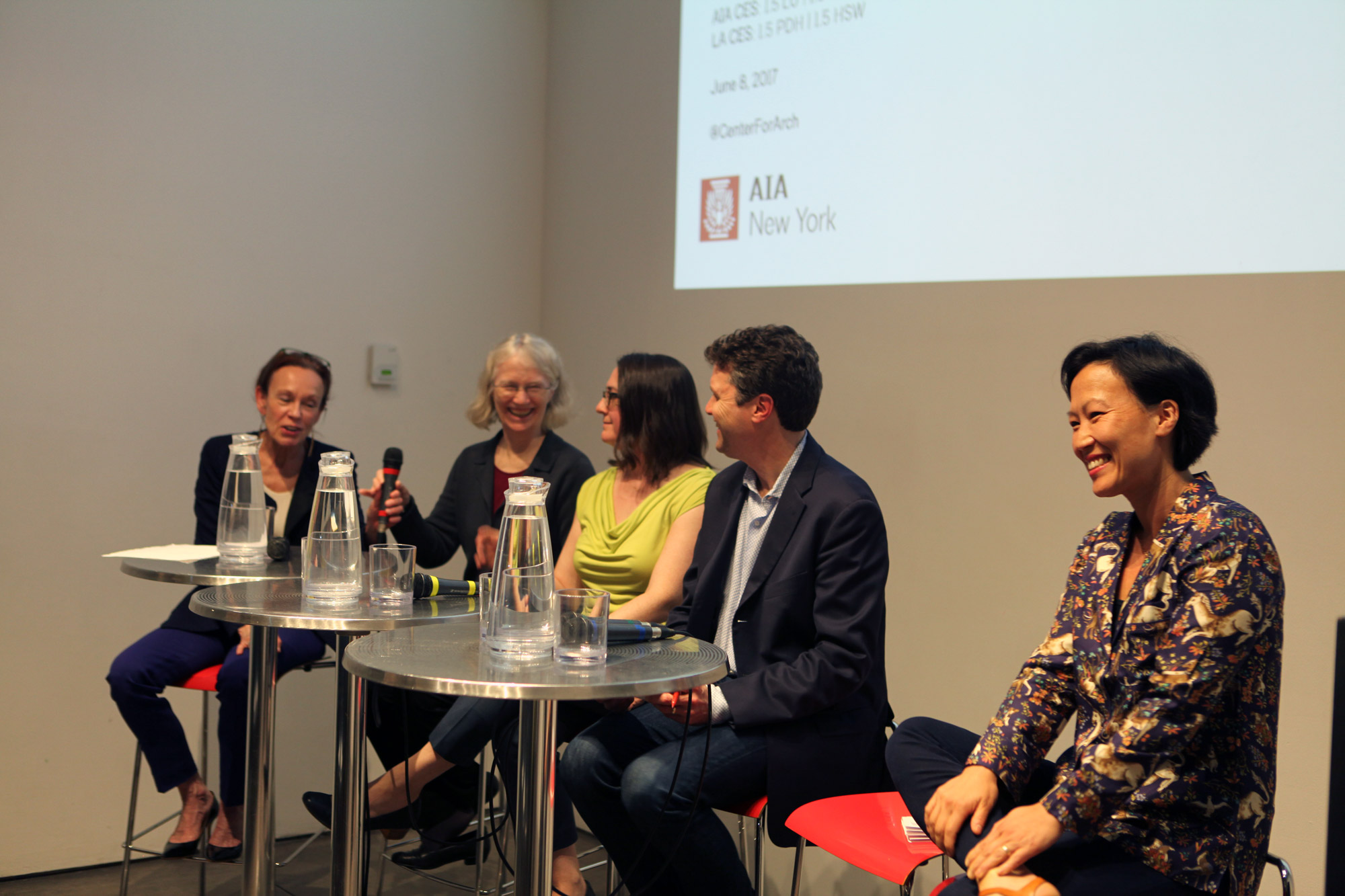by: Anna Gibertini
On 06.08.17, the Center for Architecture continued the environmental momentum from the previous night’s lecture with a panel discussion on the effects of climate change on New York City’s future urban design. While the previous lecture addressed what individual property owners could do to mitigate their environmental impact through retrofitting, “Climate Change in NYC: Bridging Science and Practice” focused on the imminent threat to New Yorkers of rising sea levels and increased average temperatures.
Organized by AIANY Planning and Urban Design Committee and ASLA-NY, the lecture featured co-authors of two recent publications: Climate Change and Cities (Cambridge University Press, 2017) by the Urban Climate Change Research Network and Climate Resiliency Design Guidelines by Mayor De Blasio’s Office of Recovery and Resiliency. The panelists included Susanne Desroches, Deputy Director, Infrastructure Policy, New York City Office for Recovery and Resiliency; Signe Nielsen, RLA, FASLA, Principal, Mathews Nielsen Landscape Architects; Jeffrey Raven, FAIA, LEED BD+C, Principal, RAVEN A+U; and Cynthia Rosenzweig, Senior Research Scientist, NASA Goddard Institute for Space Studies. Jee Mee Kim, AICP, Principal, HR&A Advisors, moderated the discussion.
The lecture began with the science. Panelists Desroches and Rosenzweig each presented data detailing current and projected climate forecasts. They also discussed ways in which these alarming data can be mitigated through social outreach. One of Rosenzweig’s recommendations was the development of knowledge networks within communities. These networks would be accountable for reporting climate change-related disturbances to authorities. Desroches built on that with her demonstration of new climate data mapping strategies that can be used to better plan for disasters. She noted that historic data is no longer reliable, but a stream of current climate information from a community knowledge network could provide that reliable information government agencies and urban designers need to plan for the future.
From there, Nielsen presented a series of case studies that demonstrated the use of community-originated data. She specifically mentioned Hunt’s Point in the Bronx, Coney Island Creek in Brooklyn, and the East River Waterfront Esplanade in Manhattan. Each project came with its successes, but also created new considerations and problems.
“I think we as designers present this idea that we can provide stability and consistency [with our finished work],” Nielsen said. “We can’t.”
But what Nielsen and other designers cannot provide in concrete, they can provide in principled design, Nielsen said. Through her case studies, she came up with three basic principles of designing for the future: deliver quality of life as a key performance outcome of a design; social cohesion is a key to increased resiliency; and local responses generate generalized climate responses. All of these independently-realized principles echo Rosenzweig and Desroches’ statements on the power and necessity of local communities’ self-reported climate data.
The panel discussion largely focused on the enormity of funds needed to create resilient urban design and where and how to find them. While the government was cited as a historically reliable contributor, the panelists recommended alternative sources due to the current political climate surrounding climate change. The CitiBike program was held up as a successful public/private endeavor. But again, the panelists agreed that the greatest source of funding and support would ultimately be the people who use and occupy the resilient spaces.
Event: “Climate Change in NYC: Bridging Science and Practice”
Location: Center for Architecture, 06.08.17
Speakers: Susanne Desroches, Deputy Director, Infrastructure Policy, NYC Office for Recovery and Resiliency; Cynthia Rosenzweig, Senior Research Scientist, NASA Goddard Institute for Space Studies; Signe Nielsen, RLA, FASLA, Principal, Mathews Nielsen Landscape Architects; Jeffrey Raven, FAIA, LEED BD+C, Principal, RAVEN A+U; Associate Professor and Director, Graduate Program in Urban + Regional Design, New York Institute of Technology.
Moderator: Jee Mee Kim, AICP, Principal, HR&A Advisors, Inc.
Organized by: AIANY Planning and Urban Design Committee and ASLA-NY








